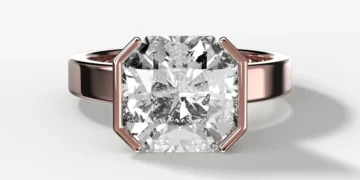
Inheriting a treasure trove of glistening trinkets from Grandma? Unearthing a forgotten jewelry box overflowing with sparkling secrets in your attic? You might be holding onto more than just sentimental keepsakes – you could be sitting on a small fortune.
But before you dive headfirst into the world of selling estate jewelry, take a deep breath. Finding the right buyer is crucial, and selling with confidence requires careful consideration.
Knowing Your Jewelry’s Worth
Before selling, familiarize yourself with your jewelry. Here’s how:
- Uncover The Gems: Identify the gemstones adorning your pieces. Research their type, cut, clarity, and color, as these factors significantly impact value.
- Metals Matter: Determine the type of metal used (gold, silver, platinum, etc.) and its hallmark markings. Knowing the metal’s purity and craftsmanship can influence price.
- Designer Delights: Look for any designer signatures or markings. Identifying renowned creators can elevate your jewelry’s worth and attract specific buyers.
- Professional Insights: You may consult a professional appraiser for a comprehensive valuation. They can reveal hidden details and provide a reliable estimate of your jewelry’s worth.
Understanding your estate jewelry is the cornerstone of a successful sale. Invest time in research and consider expert help to ensure you approach the process with confidence and clarity.

Choosing The Right Buyer
With a clearer understanding of your jewelry’s worth, you can now explore potential buyers. Here are some reputable options to consider:
- Auction Houses: Renowned auction houses like Sotheby’s or Christie’s often handle high-end estate jewelry, offering the potential for significant returns. However, be prepared for hefty commission fees and a lengthy selling process.
- Online Marketplaces: Platforms like Etsy cater to a wider audience, allowing you to set your own prices and reach a global market. Nevertheless, competition can be fierce, and online security measures must be prioritized.
- Local Jewelry Buyers: Brick-and-mortar stores specializing in estate jewelry can offer quick cash transactions and expert appraisals. Research their reputation and compare quotes from several stores before making a decision.
- Private Dealers: Experienced private dealers with a clientele for vintage or antique jewelry can be a good option for unique or historically significant pieces. Ensure their credentials are impeccable and negotiate a fair price upfront.
A responsible estate jewelry buyer will value your time, your inheritance, and your emotional connection to the pieces. Choose wisely and sell with confidence!
Negotiating And Closing The Deal
Now that you’ve identified potential buyers, it’s time to negotiate and close the deal. Here are some key tactics to keep in mind:
- Prepare Counteroffers: Anticipate the buyer’s offer and have well-reasoned counterproposals ready. Highlight your jewelry’s unique features and provenance to justify your position.
- Maintain Professionalism: Be courteous and direct in your communication but firm in upholding your desired price. Avoid emotional pleas or pressured decisions.
- Walk Away If Necessary: Don’t feel obligated to accept an unsatisfactory offer. Remember, a reputable buyer will value your pieces fairly.
- Formalize The Agreement: Once terms are agreed upon, get everything in writing—price, payment method, timeline, and any guarantees. This protects both parties.
Successful negotiation requires preparation, confidence, and clear communication. By adopting these strategies, you can secure a fair and satisfying outcome for your estate jewelry.

Ensuring A Smooth Transaction
Before you hand over your precious pieces, prioritize a secure and transparent transaction. Here are some key steps to ensure a smooth process:
- Formalize The Agreement: Don’t rely on verbal promises. Secure a written contract outlining the agreed-upon price, payment method, and timeline. This protects both parties and provides a clear reference point should any issues arise.
- Document Everything: Take photos and videos of your jewelry before, during, and after the transaction. This visual documentation serves as valuable evidence in case of damage or discrepancies.
- Follow Your Gut: If something feels off about the buyer or the process, don’t hesitate to walk away. Trust your instincts and prioritize your comfort level throughout the transaction.
By taking these precautions, you can ensure a smooth and secure sale, allowing you to focus on the sentimental significance of parting with your heirlooms.
Polishing Your Gems For A Brighter Sale
Even the most exquisite gems require a little pre-sale pampering. A gentle cleaning with a soft cloth and mild soap can remove accumulated dust and grime, revealing the inherent brilliance of your pieces.
You may also consider professional polishing for heavily tarnished pieces or intricate settings. This can restore their original splendor and elevate their perceived value.
Investing in high-quality photographs further amplifies your efforts. Capture clear, well-lit images from multiple angles, showcasing the intricacies of craftsmanship, the sparkle of gemstones, and the overall elegance of your jewelry.
Final Thoughts
Selling estate jewelry can be a bittersweet experience, but with the right knowledge and confidence, it can also be a rewarding one.
So, take your time, choose wisely, and above all, trust your gut. With this guide as your compass, you’ll navigate the world of estate jewelry sales with poise and confidence, ensuring your treasured pieces find their perfect new home.



















